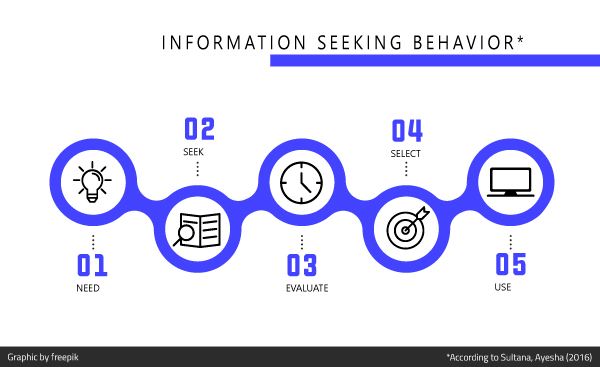Information seeking
Information seeking is the process of finding information to fill a knowledge gap. A gap, according to Online Dictionary for Library and Information Science is a person’s knowledge that, when experienced at the conscious level as a question, gives rise to a search for an answer. If the need is urgent, the search may be pursued with diligence until the desire is fulfilled.

How do I start?
Information seeking can be done through various steps and it is begins with developing the search term until the ethical use of the information. The step are follows:
- Developing the search term
Developing the search term are crucial at the begining of information seeking. A well construct search term will help you to explore more quality resources and lead to specific information according to your needs. Moreover, it will show your “understanding” on your chosen topic and it also can be used as a good “keyword”. For instance, some terms or keyword that attached to the choosen topic may have specific word like local slang, jargon word or abbreviation. You may use tools like encyclopedia, thesaurus, research starter@mulia 3.0, and scholarly databases. All the tools are accessible, kindly contact library for more information. - Searching technique
A proper searching technique are important. Everyone that requires information use search engines and spent most of thier time continuously looking for the right information due to unaware of proper searching technique. In a worst case scenario, some of the information that they found are mostly not related to their needs or junk. Learn a good search techniques can help you to get better result and save your time on harvesting the information. The common search technique are:
*Keyword Search – best used for subject terms, jargon or slang
*Phrase Search – Used quotation mark symbol to improved the precision of result, e.g: “network sensing”
*Truncation – Add a wildcard symbol, e.g: Bank* (system will search Banks, Bankers, Etc.)
*Boolean Logic – an algebra which is centered around three simple words known as Boolean Operators: “Or,” “And,” and “Not”. - Search engines and tool
Know your search engines and tools very well as it will help you to get the information that you need. SHDL subscribed to more than 30 databases, and some of it may not related to area or subject of your interest. - Evaluation criteria
Once you found the information that matches the requirements, you should evaluate these information sources. This will help to you think critically about the authority, accuracy/quality, objectivity/purpose, timeliness and relevancy. On a side note, World Wide Web has more information available that surpassed most libraries in the world. However, it may surpassed the quantity, but not the quality of information available within the libraries. - Ethics in using information
In any research project or assignments, a literature review is involved by using others work in which lead you to citing, quoting and paraphrasing. Therefore, a proper ethical use of information is needed by giving a credit/ acknowledgement to original author (citation and reference).
Siti Hasmah Digital Library
Multimedia University,
Jalan Multimedia,
63100 Cyberjaya,
Selangor, Malaysia
Opening Hours during Breaks & Exam Weeks
Trimester Break:
Weekdays, 9am – 5pm Closed during weekends
Examination Week:
Everyday, 9am – 12am
© Copyright 2020 Multimedia University. All Rights Reserved. | Privacy Notice | Notis Privasi
